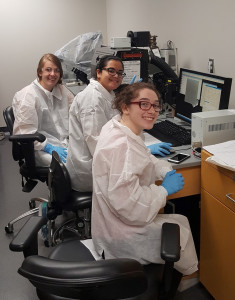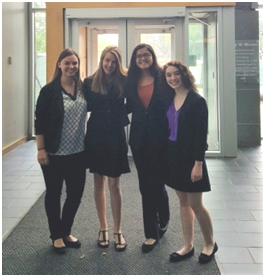 Anyone who has ever spent a summer on campus knows that come July, it is swarming with running, smiling, and laughing youngsters. It is nearly impossible to walk into the Busch Campus Center without seeing someone under the age of 18. This is because of the numerous summer camps that are held each year at Rutgers University.
Anyone who has ever spent a summer on campus knows that come July, it is swarming with running, smiling, and laughing youngsters. It is nearly impossible to walk into the Busch Campus Center without seeing someone under the age of 18. This is because of the numerous summer camps that are held each year at Rutgers University.
One of those programs is called The Academy at Rutgers for Girls in Engineering and Technology (TARGET). It is a 6-week long program that caters to girls in 6th through 11th grades. For one week at a time, Rutgers hosts girls from each grade and takes them through various science and engineering activities. The girls who are rising high school seniors and part of TARGET VI have the unique opportunity to conduct university-level research under the guidance of a female graduate student. That's where I stepped in.
This year was my 3rd year being a TARGET VI mentor. Every year, I look forward to the opportunity to spend time with these aspiring female scientists. They bring me back to my teenage years, and I have so much fun teaching and learning with them. In preparation for the TARGET week, I planned out a relatively simple and fundamental experiment for the students to carry out with me. I kept it basic enough so that they could grasp it (because believe me, they are already learning A LOT in the course of five days), however I also designed an experiment that would provide useful knowledge for my research project. Not knowing what the results would be and forming hypotheses together as a group is an important part of the scientific process that I intentionally exposed the students to, because, that is what experimentation is all about! They truly experienced real-world research during this week.
Witnessing the students’ immense growth over the course of just one quick week is always astounding to me. On the first day, they learned the definitions of terms that are used daily in the world of biomedical research. When one of my students went home that day and told her parents what she had learned, her father jokingly said, "English, please?!" Thankfully they had the week to practice how to effectively communicate the project to their parents in preparation for their final presentations that Friday.
The rest of the week was extremely b usy, yet fun. The students learned several important lab techniques such as taking images of cells using a florescent microscope, processing the images and analyzing the results. They had to learn and understand this information quickly and package it all into a final presentation. This is a lot of work in one week!
usy, yet fun. The students learned several important lab techniques such as taking images of cells using a florescent microscope, processing the images and analyzing the results. They had to learn and understand this information quickly and package it all into a final presentation. This is a lot of work in one week!
On Friday, their final group presentation was impressive, not only to me, but also to their parents and program organizers as well. The students explained the science in a way that was understandable to the audience. I was proud that I had led such an intelligent group of girls and had the opportunity to expose them to research and make an impact on their lives.
their parents and program organizers as well. The students explained the science in a way that was understandable to the audience. I was proud that I had led such an intelligent group of girls and had the opportunity to expose them to research and make an impact on their lives.
If you are a female graduate student studying science or engineering at Rutgers, I highly encourage you to be a TARGET VI mentor! Not only is it an enjoyable and inspiring experience, but there are financial incentives and free lunches. My favorite part of the TARGET VI program is that I am able to accomplish work that I need to get done, while simultaneously serving as a mentor to others, which makes it that much sweeter. Moreover, as we have previously discussed on the blog, outreach signifies to future employers, academic and otherwise, that you are willing to be a positive force within the group. This kind of work may also show you just how much you like working with this age group and lead you to consider K-12 science education as a future career.
So, think back to the mentors who first exposed you to research and how different your life would be if you hadn't met them. Now, you have the opportunity to be this person for someone else!
Those who are interested in learning more about the TARGET program should contact Candiece White at cawhite@soe.rutgers.edu.